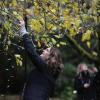September 28, 2000 - 5:00pm
Tanya Wood is making a name for herself and for Malaspina University-College.
She graduated last June with a Bachelor of Science (Biology) degree and was accepted straight into the Ph.D. program at the University of British Columbia (UBC), recently.
"It's rare for an undergraduate student to skip the Master's degree and go directly into a doctoral program," says UBC professor Dr. Ross MacGillivray.
Wood was accepted because of her superb academic record, her research experience, and her outstanding recommendations from Malaspina faculty.
"When Tanya applied for the Ph.D. program, she competed against national and international students," adds MacGillivray. "She rose to the top."
Co-winner of the Malaspina Biology Department's Outstanding Student Award for 2000, Wood also won a full UBC fellowship to fund her graduate studies at UBC.
"These are highly competitive scholarships," adds MacGillivray. About 60 students apply each year for three or four fellowships."
"I'm still in awe and totally overwhelmed," says Wood. "It's an enormous honour. Coming from a small university, it's a dream come true."
Wood's success is a strong indication that Malaspina's independent degree program is highly respected and equivalent to big city universities, says MacGillivray, a UBC professor for 20 years.
"In my view, there are terrific advantages for students who attend smaller universities like Malaspina for undergraduate degrees," says MacGillivray. "Class sizes are smaller, and students have more personal contact with instructors. The instructors get to know students very well and can evaluate them better than at larger institutions.
"A student can get a fine education at a university-college," adds MacGillivray. "My experience is that students who transfer to UBC after two years or four years of study at Malaspina are highly competitive."
While at Malaspina, Wood carried out research on a cancer-causing gene under the supervision of Dr. Allan Gibson and worked in a lab for a year as a student assistant with Rob Wager, molecular biology lab demonstrator. She is studying Biochemistry and Molecular Biology at UBC. Her dissertation research will involve the protein transferrin, a major iron transport protein in human blood. She was employed in a molecular biology laboratory at UBC during the summer of 1999 and 2000.
"Obtaining an undergraduate degree at Malaspina was one of the best choices I could have made," says Wood. "I was planning to transfer to the University of Victoria after two years, but realized just how much I was learning at Malaspina. There was no point leaving such a great school," she says.
"Not only did I gain a strong theoretical background in my field, but due to both upper-level courses and from working in the labs at Malaspina, I was able to gain valuable practical 'hands-on' experience. As an undergraduate at a larger institution, I wouldn't have had the same opportunity."
Science graduates from Malaspina have fared exceptionally well since independent degrees were first issued four years ago, says Wager. Several Malaspina Biology graduates are currently employed by the Pacific Biological Station, Health Canada, and the Ministry of Environment. Others have gone straight into various graduate schools in a variety of biological disciplines. One recent graduate, Dianna Saam, is completing her veterinary science degree at the University of Saskatchewan. For more information about these and other Malaspina Biology graduates, see the alumni newsletter at the Biology department's website at viu.ca/biology.
Tags: In the Community






